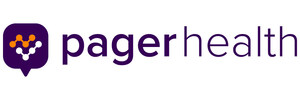Enterprise-Ready AI Offerings Built Into Pager's End-to-End Connected Care Experience
NEW YORK, April 3, 2024 /PRNewswire/ -- Pager Health (Pager), healthcare's most trusted virtual-first engagement and navigation platform serving 28 million members in the United States and Latin America, today announced the development of three new applications built on Google Cloud's advanced generative AI (GenAI) capabilities.
The GenAI applications are designed to address the quadruple aim of care by reducing the administrative burden on multi-disciplinary care teams and creating a more conversational, personalized experience for members that helps them navigate, coordinate, and take the next best step in their healthcare journey. Pager's industry-leading platform provides a seamless, embedded, connected care experience for payer clients, partner care teams and members. The new GenAI applications include:
Chat Summarization: A valuable time-saving tool for care and service teams, Chat Summarization, powered by GenAI, instantly summarizes interactions with members and provides accurate notes, eliminating documentation redundancies – saving 10 to 15 minutes on average per each member encounter.
FAQ Bot: Using a Retrieval Augmented Generation (RAG) model built on Google's Dialogflow™, Pager's FAQ Bot expedites administrative issues and reduces the need for unnecessary call center encounters. The solution is designed to answer and/or augment responses to the most common health and benefits questions while giving members immediate access to the information and guidance to take the next best step in their care journey.
Sentiment Analysis: Powered by Google Vertex AI™, Pager has embedded sentiment analysis to assist care and service teams in better understanding how member emotion is progressing or changing through a chat-based encounter (e.g., happiness, frustration, fear, anxiety, worry, etc.). The AI has been trained on millions of encounters to understand nuances in chat responses including word choice, grammatical accuracy, style, tone, speed of answer and emoji usage that might indicate sentiment. Pager teams are currently using the model to review nurse encounters, train staff and recommend new response tools, such as when it may be appropriate to use a different tone, escalate a call or try a different tactic in a conversation with a member based on their sentiment.
"With the development of any AI capability, our goal is not to replace the human touch in healthcare but to make healthcare more human," said Rita Sharma, chief product officer at Pager. "By leveraging advanced AI models, such as GenAI, we're able to automate time-consuming, manually intense processes without compromising member and employee privacy or experience – reducing clinician burnout and better allocating staff time and resources where they are needed most."
Since announcing the partnership with Google Cloud last April, Pager and its clients have benefitted from the support of a secure, scalable, and reliable world-class infrastructure. The partnership has also enabled access to Google's suite of trusted solutions, such as VertexAI, used to test and power new GenAI models, Google Cloud's Healthcare API, and BigQuery™, a fully managed enterprise data warehouse, as well as Google AI and data analytics.
"Generative AI is fundamentally changing how many healthcare organizations operate, fueling a new era of simplification, personalization, and care coordination," said Amy Waldron, global director, Healthcare and Life Sciences Industry Strategy, Google Cloud. "By using Google Cloud's generative AI tools, Pager is helping its healthcare enterprise customers streamline workflows, generate meaningful insights and, most importantly, directly improve member and patient care."
The GenAI capabilities work in concert with traditional AI capabilities, such as Pager's AI-powered chatbot, and the human-centered services that Pager is founded on, including care navigation, wellbeing and population health management services. The company's goal is to combine best-in-class technology, AI, and services to guide healthcare consumers to the most appropriate care settings and services.
"We've made a deep and focused commitment to AI because we believe the potential benefits for our clients, members and the healthcare system at-large are just beginning to be realized," Sharma added. "By carefully blending AI with the human experience, Pager is helping payers develop stronger relationships with its members and giving providers the time and the freedom to connect one-to-one with their patients during their entire care journey."
The new GenAI applications are expected to be commercially available later this year. For more information, please visit pager.com or schedule a free demo.
About Pager Health
Pager Health is a leading virtual-care, tech-enabled services platform that engages, guides and connects people to access the right care, in the right place, at the right time with a trusted, personalized "doctor-in-the-family" experience. Through its Find Care, Get Care and Active Care solutions, Pager Health delivers a longitudinal and connected care experience, a single thread of navigation, access, coordination and management services that stitches together our fragmented healthcare system. Pager Health's comprehensive product solutions include triage, telemedicine, virtual primary care, scheduling, referrals, prescriptions, care management, care advocacy, and customer service as well as the Onlife Health and wellbeing platform. Pager Health's tech-enabled services platform combines hi-tech artificial intelligence with hi-touch concierge services through a consumer front-end omni-channel engagement platform and a 360 enterprise back-end SaaS collaboration platform. Pager Health partners with leading payers, providers and employers representing more than 23 million people across the United States and Latin America. www.pager.com
SOURCE Pager
WANT YOUR COMPANY'S NEWS FEATURED ON PRNEWSWIRE.COM?
Newsrooms &
Influencers
Digital Media
Outlets
Journalists
Opted In




Share this article